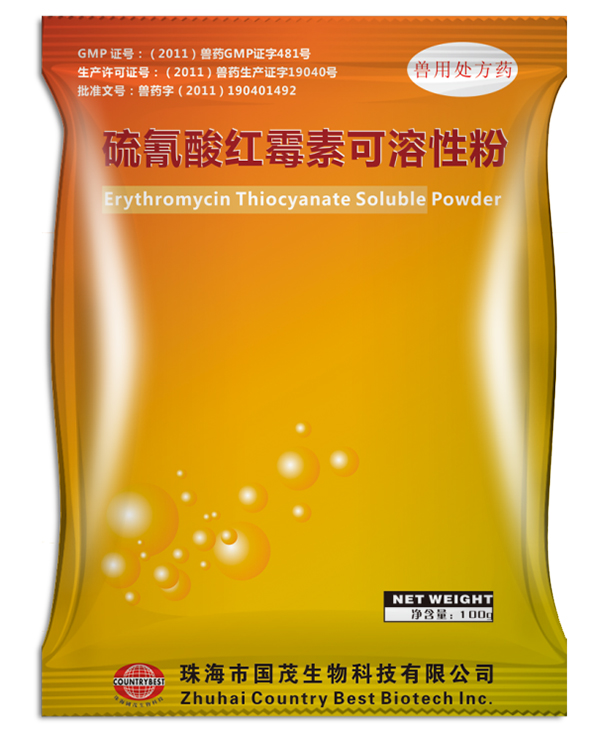|
产品详细
当前位置:
首页>
产品详细


 Erythromycin Thiocyanate Soluble PowderVeterinary drug name Generic Name:Erythromycin Thiocyanate Soluble Powder Trade Name: Chinese name:硫氰酸红霉素可溶性粉 Content specifications: 100g: 5g (5million IU) Active Ingredient: Erythromycin thiocyanate Description: white powder Pharmacodynamics: Erythromycin is a kind of macrolide antibiotics with similar mechanism as penicillin but has a broader spectrum. The Gram-negative bacteria erythromycin is sensitive to are Staphylococcus (including MRSA), Streptococcus pneumoniae, Streptococcus, Bacillus anthracis, Erysipelas, Listeria monocytogenes, Clostridium, and clostridium chauvoei. The Gram-positive bacteria erythromycin is sensitive to are Haemophilus influenza, Meningococcus, Brucella, and Pasteurella. Other than these, erythromycin is also effective against Campylobacter, Mycoplasma, chlamydia, Rickettsia, leptospiral. Erythromycin thiocyanate has a better antibacterial activity in basic environment. If the pH value increases from 5.5 to 8.5, the antibacterial activity increases. Pharmacokinetics: Erythromycin base and stearates can be easily degraded by gastric acid. The bioavailability can be determined by erythromycin’s forms and dosage kinds, the acidity of the gastrointestinal tract, and the amount of food in gastrointestinal tract. With better absorption in the gastrointestinal tract, the drug can be dispersed quickly throughout the tissue and fluid but not to the cerebrospinal fluid. The drug’s binding percentage with plasma cells is 73%~81%. Small amount of erythromycin can be digested in liver forming N- methylerythromycin and discharged through bile. Only 2%~5% of the original form of drug is dispersed through urine. Drug Interaction: 1. not suggested to administrate with other macrolides and lincosamides due to having the same effect. 2. administrate with β-lactam antibiotics will cause antagonism to the product. 3. erythromycin can inhibit cytochrome oxidase and in treatment with other drugs may cause inhibition in some metabolism. Indications: macrolide antibiotics. In treatment for Gram positive bacteria and Mycoplasma infection such as poultry Staphylococcal disease, Streptococcosis, Chronic respiratory disease, and Infectious coryza. Administration and Dosage: oral use, poultry: 2.5g/l for 3~5 days. Contraindications: animals with dependence of the drug may cause irritation to the gastrointestinal tract such as diarrhea. Precaution: 1. Do not use on layers during laying 2. do not use with acidic compounds 3. do not administrate with other macrolides and lincosamides due to having the same effect. Withdrawal Time: 3 days. Storage: store in a tightly sealed container and keep in a dry place.
|



